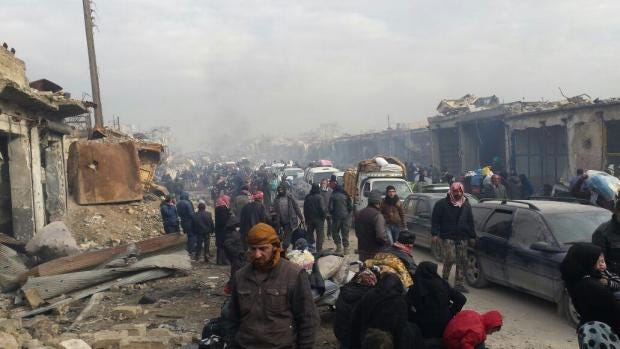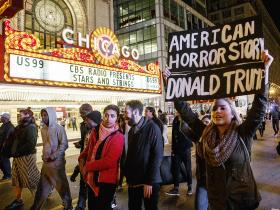There's more propaganda than news coming out of Aleppo this week
There was a period in 2011 and 2012 when there were genuinely independent opposition activists operating inside Syria, but as the jihadis took over these brave people were forced to flee abroad, fell silent or were dead
|
Click to follow
The Independent Online
The Independent Online

It has just become more dangerous to be a foreign correspondent reporting on the civil war in Syria. This is because the jihadis holding power in east Aleppo were able to exclude Western journalists, who would be abducted and very likely killed if they went there, and replace them as news sources with highly partisan “local activists” who cannot escape being under jihadi control.
The foreign media has allowed – through naivety or self-interest – people who could only operate with the permission of al-Qaeda-type groups such as Jabhat al-Nusra and Ahrar al-Sham to dominate the news agenda.
The precedent set in Aleppo means that participants in any future conflict will have an interest in deterring foreign journalists who might report objectively. By kidnapping and killing them, it is easy to create a vacuum of information that is in great demand and will, in future, be supplied by informants sympathetic to or at the mercy of the very same people (in this case the jihadi rulers of east Aleppo) who have kept out the foreign journalists. Killing or abducting the latter turns out to have been a smart move by the jihadis because it enabled them to establish substantial control of news reaching the outside world. This is bad news for any independent journalist entering their territory and threatening their monopoly of information.
There was always a glaring contradiction at the heart of the position of the international media: on the one hand it was impossibly dangerous for foreign journalists to enter opposition-held areas of Syria, but at the same time independent activists were apparently allowed to operate freely by some of the most violent and merciless movements on earth. The threat to Western reporters was very real: James Foley had been ritually beheaded on 8 August 2014 and Steven Sotloff a few days later, though long before then foreign journalists who entered insurgent-controlled zones were in great danger.
0:00
/
0:38
Aleppo citizen films last message before leaving city
But the threat was just as great for a local persons living under insurgent rule who criticised their actions or ideas. This is made clear by an Amnesty International report published in July this year entitled Torture Was My Punishment. Philip Luther, director of the Middle East and North Africa Programme of Amnesty International, says that in these areas civilians “live in constant fear of being abducted if they criticise the conduct of armed groups in power or fail to abide by the strict rules some have imposed”.
Any genuinely independent journalists or activists are targeted, according to the report. Speaking of Jabhat al-Nusra (which has renamed itself Jabhat Fatah al-Sham and was formerly the Syrian branch of al-Qaeda), a 24-year-old media activist called “Issa” said “they are in control of what we can and cannot say. You either agree with their social rules and policies or you disappear.”
What follows after such an abduction is made clear by a political activist called “Ibrahim” who in 2015 organised a peaceful protest in support of the 2011 uprising. Such independent action was evidently unacceptable to Nusra who kidnapped him. He says: “I was taken to the torture room. They placed me in the shabehposition, hanging me from the ceiling from my wrists so that my toes were off the ground. Then they started beating me with cables all over my body… after the shabeh they used the dulab (tyre) technique. They folded my body and forced me to go inside a tyre and then started beating me with wooden sticks.”
Bassel, a lawyer in Idlib, said: “I was happy to be free from the Syrian government’s unjust rule, but now the situation is worse.” He criticised Nusra on Facebook and was immediately detained. Amnesty says the main armed opposition groups are equally severe on anybody differing from them.
There was a period in 2011 and 2012 when there were genuinely independent opposition activists operating inside Syria, but as the jihadis took over these brave people were forced to flee abroad, fell silent or were dead. In August 2013, I appeared on the same television programme as Razan Zaitouneh, a renowned human rights lawyer and founder of the Violations Documentation Centre which recorded crimes and atrocities. She was speaking by Skype from the opposition stronghold of Douma in north east Damascus where I had been the previous year, but it had become too risky for me to visit.
Zaitouneh was describing the sarin poison gas attack that had killed so many people in rebel-held districts of Damascus and denouncing the Syrian government for carrying it out. She was an advocate for the non-jihadi Syrian opposition, but she also criticised the Saudi-backed Jaish al-Islam movement that controlled Douma. On 8 December, its gunmen broke into her office and seized her and her husband Wael Hamada, and two civil rights activists: Samira al-Khalili, a lawyer, and Nazem al-Hamadi, a poet. None of the four have been seen since and are very likely dead.
0:00
/
1:06
Aleppo children beg to be rescued in heartbreaking video from bombed out Syrian city
It was convenient for the international media to broadcast the videos and Skype interviews from east Aleppo as if they had been given as freely as in Copenhagen or Edinburgh. To do otherwise would have damaged the credibility of the graphic and compelling material in which the speakers looked frightened, and with good reason, and there was the crackle of gunfire and the boom of exploding shells.
None of this was necessarily fake – but there were many omissions. There was no sign of the 8,000 to 10,000 armed fighters whom the UN estimated to have been in east Aleppo. In fact, I cannot recall seeing anybody with a gun or manning a fortified position in these heart-rending films. The only visible inhabitants of Aleppo are unarmed civilians, in complete contrast to Mosul where the Iraqi armed forces are battling thousands of Isis gunmen who are using the civilian population as human shields.
It would be simple-minded to believe that this very appealing and professional PR for the Syrian armed opposition is all their own work. Foreign governments play a fairly open role in funding and training opposition media specialists. One journalist of partly Syrian extraction in Beirut told me how he had been offered $17,000 a month to work for just such an opposition media PR project backed by the British government.
The dominance of propaganda over news in coverage of the war in Syria has many negative consequences. It is a genuine civil war and the exclusive focus of on the atrocities committed by the Syrian armed forces on an unarmed civilian population gives a skewed picture of what is happening. These atrocities are often true and the UN says that 82 civilians may have been summarily executed in east Aleppo last month. But, bad though this is, it is a gross exaggeration to compare what has happened in Aleppo to genocide in Rwanda in 1994 or the massacre in Srebrenica the following year.




Geen opmerkingen:
Een reactie posten